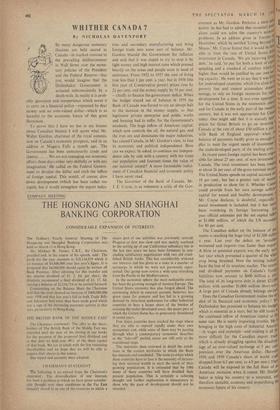WHITHER CANADA?
By NICHOLAS DAVENPORT To prove that I have no bee in my bonnet about Canadian finance I will quote what Mr. Walter Gordon, chairman of the royal commis- sion on Canada's economic prospects, said in an address at Niagara Falls a month ago. The Government has been unnecessarily crude and clumsy. . . . We arc not managing our economic affairs these days either very skilfully or with any imagination.' He called on the Federal Govern- ment to devalue the dollar and curb the inflow of foreign capital. This would, of course, slow down development (which has been rather too rapid), but it would strengthen the export indus- tries and secondary manufacturing and bring foreign trade into some sort of balance. Mr. Gordon blamed the Government for inflation and said that it was stupid to try to stop it by tight money and high interest rates which pressed heavily on the areas and people most in need of assistance. From 1952 to 1957 the cost of living rose less than 1 per cent. a year, but in 1958 (the first year of Conservative power) prices rose by 21 per cent. and the money supply by 16 per cent. —chiefly to finance the government deficit. When the budget stayed out of balance in 1559 the Bank of Canada was forced to cry an abrupt halt to the increase in the money supply, so that legitimate private enterprise and public works and housing had to suffer for the Government's misdeeds. The huge inflow of American capital. which now controls the oil, the natural gas, and the iron ore and dominates the major industries, has caused Canada, in Mr. Gordon's view, to lose its economic and political independence. How can we expect. he asked, to continue our indepen- dence side by side with a country with ten times our population and fourteen times the value of our national output? A more formidable indict- ment of Canadian financial and economic policy I have never read.
The Governor of the Bank of Canada. Mr. J. E. Coyne, is as. vehement a critic of the Gov- ing capacity.' He went on to say that it was fitil ‘‘‘,‘: for undeveloped countries, which live close to 1°, tl; poverty line and cannot accumulate dole59; re savings, to rely on foreign resources for caP fa development for a time. It was even approPri/g at for the United States in the nineteenth cent1111 and for Canada in the early part of the twenh,, century, but it was not appropriate for Gnaw today. One might add that it is scarcely aPPr'' priate for Great Britain to go on investing ° Canada at the rate of about £50 million a year with Bank of England approval—when a`' balance of payments hardly gives us enough suf. plus to meet the urgent needs of investment the underdeveloped parts of the sterling area eminent as Mr. Gordon. Perforce a stern de. , tionist. he has had to admit that monetary P0141 alone could not solve the country's econor°1; problems. In an address given in Toronto December, which he entitled 'Living Beyond Means.' Mr. Coyne hinted that it would be des6 able to limit the rate of United States do1,1► investment in Canada. 'We are incurring Well debt,' he said, 'to pay for both a level of caP1 speeding and a standard of comfort which 311 higher than would be justified by our own east In recent years foreign capital has been roe. sible for about 27 per cent. of new investment° Canada. The total investment has been runtli° at about 26 per cent. of the gross national illogic: The United States spends on capital account 01111 18 per cent., but has a greater rate of increa0 in production to show for it. Whether Can0 could provide from her own savings sufliciel capital for sound and healthy development, Is Mr. Coyne declares, is doubtful, especially social investment is included, but it has sum been overdoing its foreign borrowing. year official estimates put the net capital inflow; at $1,000 million, of which the US account. for 80 per cent. The Canadian deficit on the balance of Par ments is reaching the huge total of $1,500 milli°, a year. Last year the deficit on 'invisibles worsened and imports rose faster than export' A blow to potential exports was the early snot last year which prevented a quarter of the wiles', crop being threshed. Now the mining industri faces the loss of its uranium market. The interest and dividend payments on Canada's ford liabilities now amount to $600 million a Yea_1• The total of its long-term debt is about $21,0P million with another $1,000 million short-teral A large part of Canada already belongs abroad' Does the Canadian Government realise the shot of its financial and economic policy? Mr Diefenbaker has promised to balance his budget which is essential as a start, but he still looks j° the continued inflow of American capital at the same rate. He is surely importing trouble. He i5 bringing in the high costs of industrial Ameriel —in wages and materials—and making it all the more difficult for the Canadian export trade' which is already struggling against the disadvaly tage of an over-valued exchange at 5 per cat premium over the American dollar. (I3etwee11 1956 and 1959 Canada's share of world track dropped from 6.1 per cent. to 4.9 per cent.) Thtei) Canada will be exposed to the full blast of a° American recession when it comes. Mr. Diefee' baker is tying his country to a saturated, and therefore unstable, economy and jeopardising lh° economic future of his country.


































 Previous page
Previous page